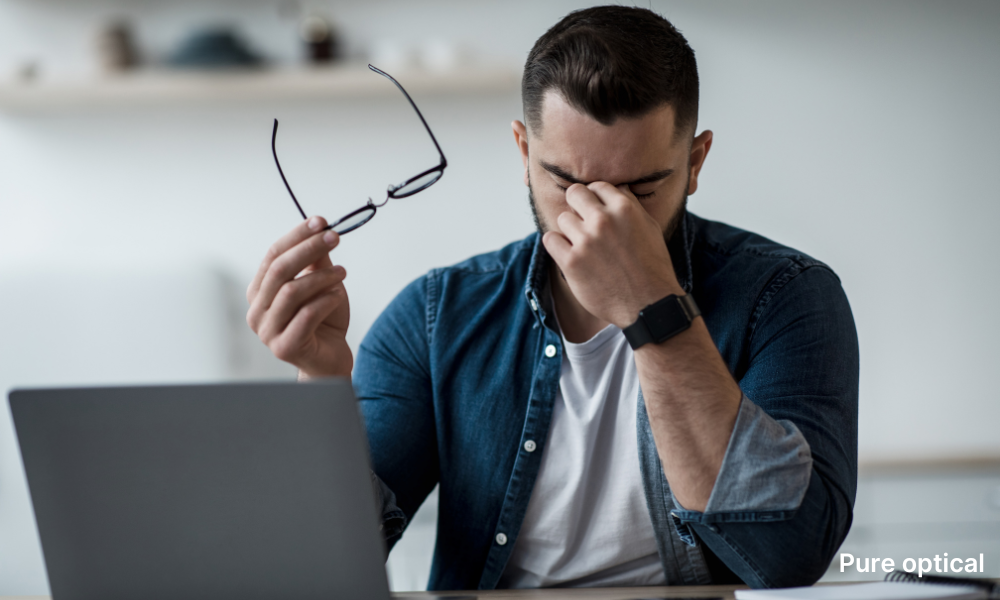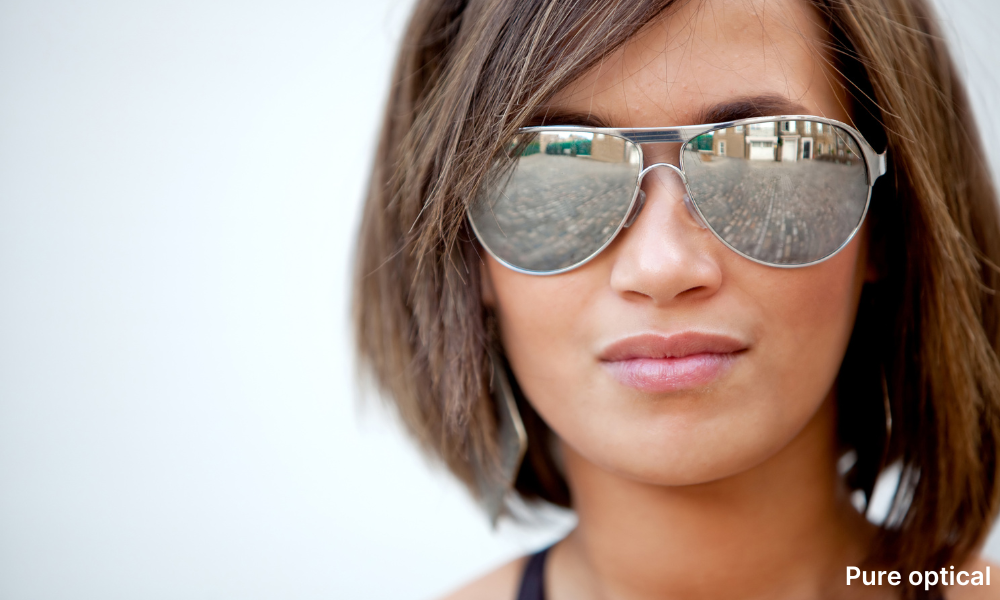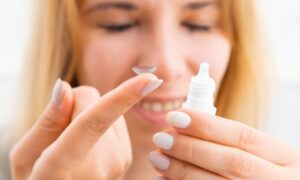In this article, we will explore 11 key habits for healthy eyes that can help preserve and enhance your eye health. Whether you’re looking to optimize your current eye care routine or start fresh, these eye health tips are essential for anyone interested in protecting their vision.
1. Ensure proper lighting
Ensuring proper lighting in your environment is essential for maintaining eye health and preventing strain. Poor lighting—whether it’s too dim or excessively bright—can lead to significant discomfort, causing headaches, eye strain, and a faster onset of fatigue.
Ideal lighting conditions balance natural and artificial light to avoid glare on computer screens and other digital devices, which exacerbates eye strain.
During the day, maximize the use of natural light by keeping windows clear of obstructions and using sheer curtains to diffuse bright sunlight.

For indoor settings, particularly in workspaces and areas for reading, use adjustable and indirect lighting that illuminates tasks effectively without causing a glare.
It’s also beneficial to use task lighting that provides sufficient, focused light on specific activities, complemented by ambient lighting that fills the overall space softly, reducing harsh shadows and contrast.
Adopting these lighting strategies can significantly reduce eye discomfort and support better overall visual health.
2. Consume a nutrient-rich diet
Consuming a nutrient-rich diet is fundamental for maintaining optimal eye health. Essential nutrients such as vitamins A, C, and E, alongside minerals like zinc and the omega-3 fatty acids, play significant roles in supporting eye function and warding off age-related vision problems.
Vitamin A, for instance, is crucial for maintaining healthy corneas and retinal health, while the antioxidants in vitamins C and E help combat the stress and damage caused by free radicals.
Omega-3 fatty acids, found in fish like salmon and sardines, contribute to visual development and the health of the retina. Moreover, zinc helps in transporting vitamin A from the liver to the retina, aiding in the production of melanin, a protective pigment in the eyes.
By incorporating a variety of colorful fruits and vegetables, lean proteins, and healthy fats into your daily meals, you can provide your eyes with the nutrients they need to function optimally, potentially reducing the risk of chronic eye diseases and protecting your vision.
3. Prioritize adequate sleep
Sleep is essential for eye health. A good night’s sleep helps to clear out irritants such as smoke, dust, and allergens that accumulate throughout the day.

Aim for 7- 8 hours of quality sleep per night to help maintain healthy, hydrated, and well-rested eyes.
4. Wear UV-protective sunglasses
Wearing UV-protective sunglasses is an essential habit for safeguarding your eye health against the harmful effects of ultraviolet radiation.
Continuous exposure to UV rays can significantly increase the risk of developing eye conditions such as cataracts, which cloud the lens of the eye, and macular degeneration, which affects the retina and can lead to vision loss.
To effectively protect your eyes, choose sunglasses that block out 99% to 100% of both UVA and UVB light. It’s important to wear these protective sunglasses even on cloudy days, as UV rays can penetrate through clouds and reflect off surfaces like water, sand, and pavement, intensifying exposure.
Additionally, opting for wraparound sunglasses can provide extra protection by blocking UV rays that might enter around the frame edges.
By making UV protection a routine part of your outdoor gear, you can enjoy the outdoors while significantly reducing your risk of sun-related eye damage.
5. Reduce screen time
Reducing screen time is crucial for maintaining eye health, especially in today’s digital age where prolonged exposure to digital screens is common.
Excessive screen use can lead to digital eye strain, characterized by dry eyes, irritation, blurred vision, and headaches. It also increases the risk of potential long-term damage to the retina due to blue light exposure.

To mitigate these risks, it’s advisable to adopt habits such as following the 20-20-20 rule, where every 20 minutes, you take a 20-second break to look at something 20 feet away.
Additionally, using screen filters or adjusting device settings to minimize blue light exposure can help.
It’s also important to ensure that your work and leisure environments are ergonomically set up to support optimal eye health, including using adequate lighting to reduce glare.
By consciously limiting daily screen time and incorporating regular breaks, you can protect your eyes from undue strain and maintain better overall eye health.
6. Quit smoking
Smoking is extremely harmful to your eyes. It can increase the risk of developing cataracts, damage to your optic nerve, and macular degeneration, among other medical issues. Quitting smoking is one of the best habits for healthy eyes you can take to protect your eye health over the long term.
7. Choose the right eyewear
Choosing the right eyewear is vital for protecting your vision and enhancing your vision, whether it’s for correcting refractive errors or shielding your eyes from environmental hazards.
If you need prescription glasses or contacts, it’s crucial to have accurate and up-to-date prescriptions that reflect your current vision needs. Regular eye exams ensure that your prescription is adjusted as needed, which is essential for preventing eye strain.
For those involved in sports or hazardous work environments, investing in protective eyewear is key to prevent injuries. Features like polycarbonate lenses offer high-impact resistance and are ideal for activities that pose a risk of eye injury.

Additionally, for outdoor activities, opt for sunglasses with 100% UV protection to shield your eyes from harmful UV rays.
By carefully selecting eyewear that meets your visual and lifestyle needs, you can greatly enhance your eye comfort, performance, and safety.
8. Keep your hands clean and avoid touching your eyes
Frequently touching your eyes without washing your hands can lead to infections like conjunctivitis. Always ensure your hands are clean before applying contact lenses or touching your face and eyes.
9. Manage chronic conditions
Conditions like diabetes and high blood pressure can lead to eye health problems if not managed properly. Maintain a healthy lifestyle and follow your healthcare provider’s instructions to control such conditions, protecting your eyesight.
10. Use humidifiers
Dry environments can cause eye irritation and discomfort. Using a humidifier in your home or office can help maintain adequate humidity levels, providing relief for dry eyes.
11. Schedule regular eye exams
One of the most effective habits for healthy eyes is to ensure regular eye exams. These check-ups are not just about determining if you need glasses, but also about spotting potential eye health issues before they develop into serious problems.
Optometrists can detect signs of conditions like glaucoma, cataracts, and macular degeneration early on, which is crucial for effective treatment.

Conclusion
Adopting these habits can significantly improve the health of your eyes and ensure you maintain good vision as you age. Start incorporating these eye health tips into your daily routine and notice the benefits for your overall well-being and vision. Remember, protecting your eyes starts with simple changes and proactive habits.




